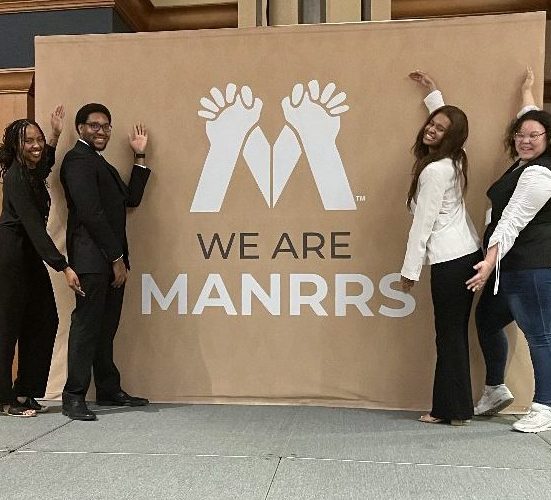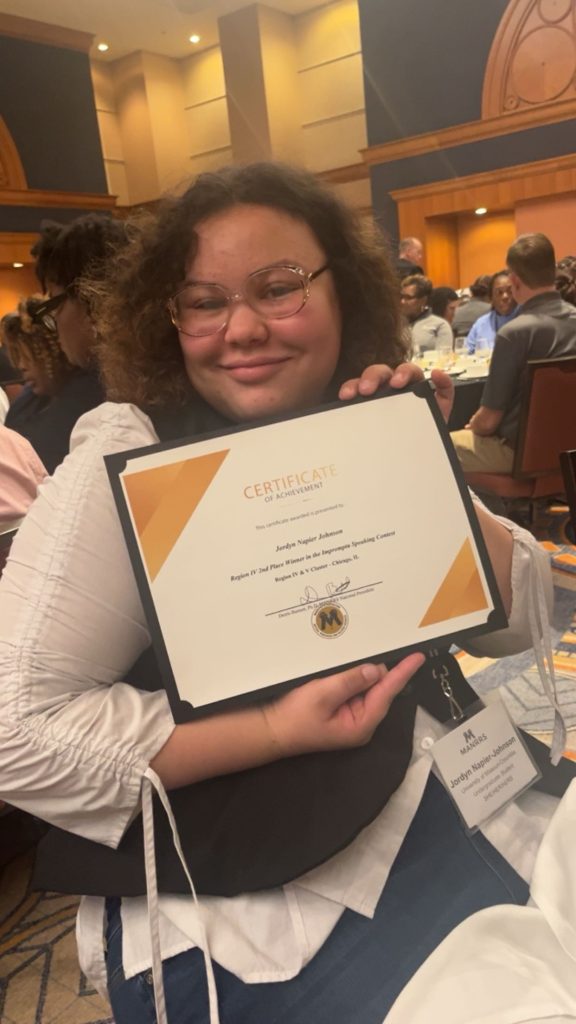
When Jordyn Napier transferred to Mizzou from Kansas State University, one of the first things she did was join Mizzou MANRRS. Napier was involved in MANRRS at her previous university and was eager to become involved in Mizzou’s growing chapter. Now a sophomore majoring in food science and nutrition, Napier is passionate about her work as the secretary of the Mizzou MANRRS chapter.
“I love being able to have that close-knit group and having a bond with other people who look like you, who understand your struggles; but at the same time you can meet students who are coming to learn from minority students’ experience and their struggles as well,” said Napier. “You don’t have to be an ag major, and you don’t have to be a minority student. What we want to do is provide professional development, with a fun learning environment at the same time, where students can come learn about different companies, interviewing, internship opportunities, and be an open outlet for students to come and express themselves.”
MANRRS members had the opportunity to attend the MANRRS Regional Cluster Meeting in Chicago in October, where Napier placed second in the impromptu speaking competition, earning a spot to compete at the national MANRRS 38th Annual Training Conference and Career Expo in Chicago in March. In addition to professional development competitions, MANRRS students can also network with members and employers from across the nation at the conferences.
Daniel Harris, Mizzou MANRRS president and senior chemistry major, learned about opportunities in every facet of the agriculture and natural resources industry by attending the regional conference.

“While I had a passion for natural resource sciences, I didn’t realize how well qualified I was to work for some of these companies until I talked to them at the career fairs at Regionals,” said Harris. “I didn’t necessarily see the direct line between my passion for chemistry and my passion for water quality and conservation until I found MANRRS, and it was a pleasant surprise to see that avenue is possible.”
Charles Nilon, William J. Rucker Professor, Natural Resources Graduate Coordinator, Human Dimensions, and Undergraduate Coordinator for Natural Resource Science & Management, has been one of the faculty advisors for MANRRS for 32 years.
“The most exciting thing about working with MANNRS is seeing how excited students become when they discover that they are not the only minoritized student in their major,” said Nilon. “Seeing CAFNR and MANRRS alums who are established in their careers is also a high point for me as the advisor.”
The MANRRS chapter is making an effort to grow their membership in a post-COVID environment. This semester they will be hosting companies such as Land O’ Lakes, Cargill and Hormel for professional development events, and are looking into starting a junior MANRRS chapter in the Columbia area.
“I definitely want to make sure that we have a junior MANRRS program with a local high school or middle school, so they know that agriculture isn’t just about farming,” said Napier. “I’m an urban girl from Kansas, and that’s what I thought about agriculture. But now that I’m in my major in CAFNR, I’ve learned that it’s not just farming; it’s also about the business side, the economic side, food processing and many other things, and I want to be able to pass that down to younger students.”
Harris is eager to invite students from all backgrounds to join MANRRS and play a part in their growth.
“As we gain more members, I envision MANRRS as a major organization in CAFNR where students can truly thrive,” said Harris. “It’s not very often that students can join a smaller club and get to shape it so much as it grows into a place where all people can feel comfortable and supported.”